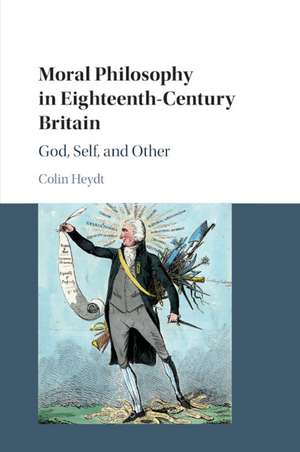Moral Philosophy in Eighteenth-Century Britain: God, Self, and Other
Autor Colin Heydten Limba Engleză Paperback – 12 iun 2019
Toate formatele și edițiile
| Toate formatele și edițiile | Preț | Express |
|---|---|---|
| Paperback (1) | 280.79 lei 6-8 săpt. | |
| Cambridge University Press – 12 iun 2019 | 280.79 lei 6-8 săpt. | |
| Hardback (1) | 588.92 lei 38-44 zile | |
| Cambridge University Press – 29 noi 2017 | 588.92 lei 38-44 zile |
Preț: 280.79 lei
Nou
Puncte Express: 421
Preț estimativ în valută:
53.75€ • 55.28$ • 44.59£
53.75€ • 55.28$ • 44.59£
Carte tipărită la comandă
Livrare economică 19 februarie-05 martie
Preluare comenzi: 021 569.72.76
Specificații
ISBN-13: 9781108431316
ISBN-10: 1108431313
Pagini: 297
Dimensiuni: 153 x 230 x 20 mm
Greutate: 0.4 kg
Editura: Cambridge University Press
Colecția Cambridge University Press
Locul publicării:Cambridge, United Kingdom
ISBN-10: 1108431313
Pagini: 297
Dimensiuni: 153 x 230 x 20 mm
Greutate: 0.4 kg
Editura: Cambridge University Press
Colecția Cambridge University Press
Locul publicării:Cambridge, United Kingdom
Cuprins
Part I. Foundations: 1. 'Morality not in accordance with virtues but in accordance with duties': the Pufendorfian shift in moral philosophy; 2. The structure of practical ethics: duty and virtue; 3. The structure of practical ethics: duty and right; Part II. Relations to God: 4. Duties to God, revelation, and morality's history; 5. Breaking with convention: Hume, Smith, moral philosophy, and the God of natural religion; Part III. Relations to Self: 6. Moral relations to self and the significance of self-harm; 7. Anthropological optimism, pessimism, and the scope of self-cultivation; Part IV. Relations to Others: 8. Relating to others: natural rights and community; 9. Why not polygamy? Natural law and the family; 10. Political jurisprudence and its limits.
Recenzii
'… the development of British moral philosophy in this period is irreducibly complex; Heydt's book is an immensely valuable contribution to our understanding of it.' Tim Stuart-Buttle, Journal of Scottish Philosophy
'Heydt explains clearly - with reference to a very wide variety of primary sources, some well-known, most unfamiliar - how teachers of moral philosophy in Britain in the eighteenth century presented their students with their duties to God, to themselves, and to others. All in all, this is a marvellous book … what especially struck me was the light it sheds on what the majority of moral philosophers in this place and time thought was the real point of their work.' James A. Harris, Journal of the History of Philosophy
'Heydt's scholarship is formidable. For those immersed in the literature of the period, this book will further their researches. For those, like this reviewer, who lack background knowledge in which to place the great figures, Heydt supplies a huge amount of information that could not otherwise be obtained except by great (and even tedious) labour. All those interested in [eighteenth-century] ethics are in his debt.' David McNaughton, Notre Dame Philosophical Reviews
'Heydt explains clearly - with reference to a very wide variety of primary sources, some well-known, most unfamiliar - how teachers of moral philosophy in Britain in the eighteenth century presented their students with their duties to God, to themselves, and to others. All in all, this is a marvellous book … what especially struck me was the light it sheds on what the majority of moral philosophers in this place and time thought was the real point of their work.' James A. Harris, Journal of the History of Philosophy
'Heydt's scholarship is formidable. For those immersed in the literature of the period, this book will further their researches. For those, like this reviewer, who lack background knowledge in which to place the great figures, Heydt supplies a huge amount of information that could not otherwise be obtained except by great (and even tedious) labour. All those interested in [eighteenth-century] ethics are in his debt.' David McNaughton, Notre Dame Philosophical Reviews
Notă biografică
Descriere
A new account of a vital period in the history of ethics, focusing on the content of morality.
